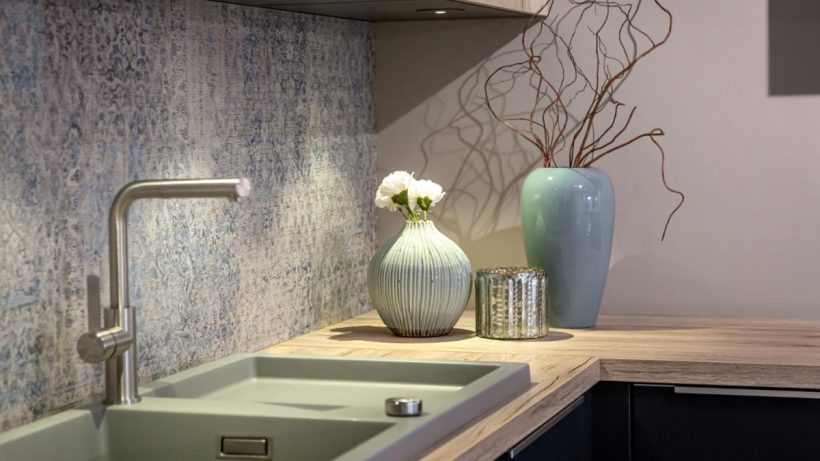Design trends in modern kitchens often revolve around sleek, functional, and visually appealing elements. Among these, glass splashbacks have emerged as a prominent feature, offering versatility, durability, and style. Here, we explore various stylish glass splashback ideas that elevate the aesthetics of contemporary kitchens.
1. Bold Monochrome Statements
Embracing monochrome designs with bold black or white glass splashbacks creates a striking visual impact in modern kitchens. A black glass splashback against light-coloured cabinets or countertops adds depth and contrast, while a white glass feature complements darker kitchen elements, creating a sense of balance and sophistication.
2. Vibrant Color Pops
Introducing vibrant colours through glass splashbacks instantly injects energy and personality into kitchen spaces. Bold shades like electric blue, fiery red, or citrusy yellow create focal points and accentuate specific areas, serving as captivating design elements. These colourful options allow homeowners to express individuality while infusing vibrancy into the kitchen’s ambience.
3. Nature-Inspired Designs
Nature-themed glass splashbacks bring the outdoors inside, creating a serene and refreshing atmosphere. Patterns featuring lush foliage, peaceful landscapes, or abstract natural elements like water ripples or pebbles offer a calming effect, fostering a connection with nature within the kitchen environment.
4. Industrial Chic Finishes
For a contemporary industrial look, opt for glass splashbacks with metallic or concrete finishes. These designs mimic the raw textures of concrete or metal, imparting an urban, edgy appeal to the kitchen. Metallic finishes in silver, copper, or bronze tones add a touch of glamour and sophistication to the space.
5. Subtle Textures and Patterns
Subtle textured glass splashbacks featuring delicate patterns or embossed designs create visual interest without overwhelming the space. Frosted or etched glass panels with geometric motifs or organic textures provide a refined elegance while maintaining a minimalist aesthetic.
6. Mirror Effect and Reflective Surfaces
Mirror-effect glass splashbacks or reflective surfaces amplify natural light and create an illusion of spaciousness in smaller kitchens. They bounce sunlight around the room, making the space brighter and more expansive. Additionally, mirrored glass adds a touch of glamour and modernity to the kitchen.
7. Customized Artistic Expressions
Personalised and bespoke designs on glass splashbacks allow homeowners to showcase their creativity. Customised artwork, family recipes, inspirational quotes, or digitally printed images can be incorporated, transforming the splashback into a unique and meaningful centrepiece.
8. Gradient or Ombre Effects
Gradient or ombre glass splashbacks transition from one colour to another, creating a visually appealing and contemporary look. This gradual colour shift adds depth and dimension to the kitchen, offering a modern twist to the traditional solid-coloured splashbacks.
9. Timeless Subway Tile Patterns
Embracing the classic subway tile pattern in glass splashbacks offers a timeless yet modern appeal. The sleek, elongated rectangular tiles arranged in a brick-like pattern provide a clean and versatile backdrop that complements various kitchen styles.
Conclusion
Incorporating stylish glass splashbacks into modern kitchen splashback offers many design possibilities. From bold monochrome statements to vibrant colours, nature-inspired motifs, industrial finishes, subtle textures, and personalised artworks, these ideas showcase glass’s versatility and aesthetic appeal as a functional and decorative element. Whether aiming for a minimalist, chic, or eclectic look, glass splashbacks serve as a canvas to elevate the design and ambience of contemporary kitchens, reflecting individual tastes and trends in interior design.
Glass thickness plays a crucial role in the functionality and durability of glass splashbacks, determining their strength and resilience in various environments. Typically, glass splashbacks come in different thicknesses, with the most common options being 6mm, 8mm, and 10mm.
The choice of thickness depends on several factors, including the intended application and the level of protection required. Thicker glass panels, such as 8mm or 10mm, offer increased strength and resistance to impact, making them suitable for areas prone to higher risks of damage, such as behind cooktops or in busy kitchens.
While 6mm glass panels are popular and offer adequate strength for most residential applications, thicker options provide added security against breakage and heat. Thicker glass tends to have higher resistance to bending or flexing, making it a preferred choice for larger installations or areas exposed to more significant pressure.
It’s essential to consider the specific requirements of your space and consult with professionals to determine the most appropriate glass thickness. A balance between functionality, aesthetics, and safety considerations should guide the choice, ensuring that the selected glass thickness meets both your practical needs and design preferences for your home.
Laila Azzahra is a professional writer and blogger that loves to write about technology, business, entertainment, science, and health.
